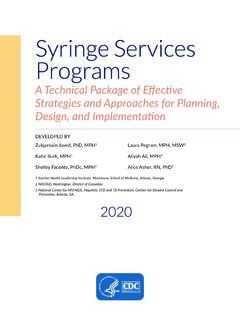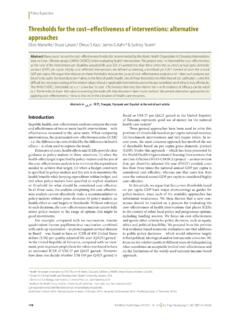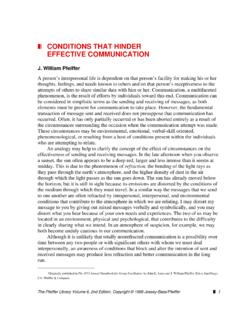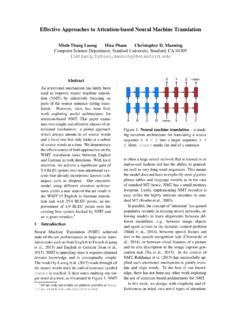Transcription of Pedagogy in early childhood education and care (ECEC): an ...
1 Pedagogy in early childhood education and care (ECEC): an international comparative study of approaches and policies Research brief July 2015 Stephanie Wall, consultant Ineke Litjens, OECD Miho Taguma, OECD Contents Background 3 Definition of Pedagogy 4 Key findings 4 England s Pedagogy has several strengths. 4 Research suggests that specific pedagogical approaches do not have better outcomes than more general pedagogical ones. 5 Certain pedagogical practices can better stimulate children s development. 5 England s and other countries pedagogical practices differ due to large flexibility in implementation. 6 Potential areas for reflection 7 2 Background The debate about what constitutes effective Pedagogy in ECEC has received increased attention in recent years, due to the acknowledgement in recent research (such as in Heckman, (2006), Skill formation and the economics of investing in disadvantaged children") that high quality early childhood education and care (ECEC) offers immense opportunities for all children, regardless of background, to develop the cognitive and social and emotional skills needed for their development, well-being and success in later life.
2 Many countries, including England, have expanded their ECEC services and emphasised the educational potential of this sector through improvements to staff qualifications, curricula and quality assurance processes. This review aims to provide an improved understanding of the range of pedagogical practices within early years' settings across the world, and the policies that impact the choice and implementation of different pedagogies. Comparisons are made between the pedagogical approaches in early years' settings in England and those in equivalent early childhood education and Care (ECEC) settings in: Japan, France, Germany, Denmark, and New Zealand alongside discussion on how policy levers can be used to influence current practice. Three research methods were incorporated in the study.
3 The latter two sources include countries self-reported practices on monitoring quality and Pedagogy . A literature review on ECEC Pedagogy conducted by researcher Dr. Yvonne Anders, in which England is compared with Japan, France, Germany, Denmark, and New Zealand; An international OECD survey on countries monitoring of quality in ECEC1; A joint OECD-England international survey on Pedagogy in ECEC2. The review begins by explaining why Pedagogy is important and how it is defined; it then describes variations in, and evidence for, pedagogical approaches in formal ECEC settings this is followed by an overview of how Pedagogy is monitored internationally; finally, the report offers some insight into the policy levers that affect pedagogical practice.
4 The full report is available to download from the OECD s website at this link: 1 The following 24 countries responded to the survey on monitoring quality: Australia, Belgium Flemish Community, Belgium French Community, Chile, Czech Republic, Finland, France, Germany, Ireland, Italy, Japan, Kazakhstan, Korea, Luxembourg, Mexico, Netherlands, New Zealand, Norway, Portugal, Slovak Republic, Slovenia, Sweden, United Kingdom England and United Kingdom Scotland. 2 The following 21 countries responded to the survey on Pedagogy : Belgium Flemish Community; Chile; Denmark; Estonia; Finland; France; Hungary; Ireland; Israel; Italy; Japan; Kazakhstan; Korea; Luxembourg; Mexico; New Zealand; Norway; Slovak Republic; Slovenia; Sweden; and United Kingdom England.
5 3 Definition of Pedagogy Pedagogy relates to the how , or practice of educating. It refers to, that set of instructional techniques and strategies which enable learning to take place and provide opportunities for the acquisition of knowledge, skills, attitudes and dispositions within a particular social and material context. It refers to the interactive process between teacher and learner and to the learning environment (Siraj-Blatchford et al. 2002). It concerns the how of adult and child interaction, whilst recognising that how children learn and develop at this stage is not just subject to what is intended to be taught, but it is also of particular importance how it is facilitated. International studies recognise that children s capabilities are shaped by the quality and range of early experiences and interactions in both the home and ECEC environment.
6 Experiences of young children in ECEC settings are defined by process quality. Process quality refers to the nature of the pedagogical interactions between ECEC staff and children, as well as interactions between peers, and with their environment. Research has shown these interactions and experiences are one of the most significant factors explaining the effects of care and early education on children s learning and development. Key findings England s Pedagogy has several strengths. Firstly, England s pedagogical approach, as outlined in the curriculum, puts emphasis on age-appropriateness and play in Pedagogy , and encourages staff to employ different approaches and practices flexibly. Secondly, along with Denmark, German L nder and New Zealand, England promotes continuous child development for the whole ECEC age range due to implementation of one over-arching curriculum framework.
7 Thirdly, England has favourable staff-child ratios in place that can positively impact Pedagogy . The regulated number of children per practitioner (or staff-child ratio) can influence how much time practitioners can spend per child. With a higher number of children per staff, conditions for individualized attention and interaction with children are less favourable. England and Finland have the most favourable staff-child ratios in place for children below the age of three. England s staff-child ratio of 1:8 to 1:13 (depending on staff qualifications) for preschool-aged children aged three and older is better than the OECD average, but less beneficial than New Zealand s ratio or the regulated ratio in many German L nder. Finally, there is a strong monitoring system in place which even monitors process quality.
8 Only England, German L nder, and New Zealand monitor process quality or pedagogical quality in particular. The scope of monitoring process quality in Germany and New Zealand is broader than in England, including aspects such as the overall quality of teaching/instruction/caring; relationships and interactions between staff and children; collaborations between staff and parents, management, or between colleagues; Pedagogy ; and implementation of curriculum by staff. 4 Research suggests that specific pedagogical approaches do not have better outcomes than more general pedagogical ones. In general, research has revealed a mixed picture in terms of the impact on children s outcomes of approaches with a specific pedagogical programme, such as Montessori or Steiner.
9 That said, it is necessary to point out that research evidence and studies considering the exact same approaches in the exact same context are very limited. Studies indicate that approaches that adhere strictly to a specific type of Pedagogy do not always result in better child outcomes compared with programmes that take a less prescriptive approach. For instance, evaluation of Developmentally Appropriate Practice (DAP) has found no direct effects on academic outcomes, although it was found to have positive impacts on children's ability to initiate and maintain interpersonal relations, and in the long-term on children's motivation and interest in learning. Implementation of the Montessori approach demonstrates greater gains in, for example, reading, math and social problem solving, although the effectiveness is conditional on good implementation fidelity.
10 Alternative educational programmes such as Steiner and Freinet have been found to not be any more effective in fostering children s development than mainstream programmes. England and the case study countries examined for this report do not adhere to one certain pedagogical approach at national level. Different theories underpin or contribute to countries pedagogical principles; policies and guidance are usually based on a combination of ideas of well-known theorists, even if the links are not explicitly made. In an international survey on Pedagogy , the theories of Piaget and Vygotsky, for example, are frequently mentioned to have influenced Pedagogy and curriculum in England, Germany, France and New Zealand. The Montessori approach has influenced Pedagogy in Germany and Japan, and the following theories or theorists have been of influence elsewhere: Developmentally Appropriate Practice or DAP (Japan), Reggio Emilia (Japan), Bronfenbrenner (New Zealand), Rogoff (New Zealand), Bruner (France), Freire (Germany), Robinson (Germany) and Zimmer (Germany), as well as Humboldt (Germany) and Fr bel (Germany).














